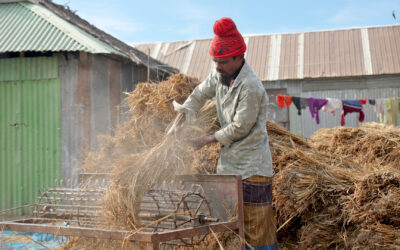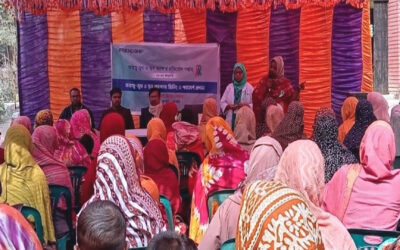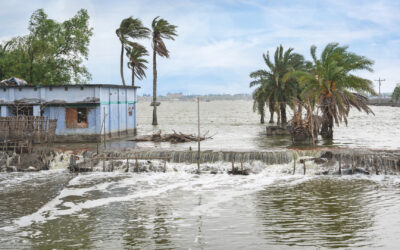A prescription for pragmatic disaster risk reduction solutions
On October 10, ahead of the International Day for Disaster Risk Reduction, Friendship brought together grassroots actors in disaster management together with the Honourable Minister for Disaster Management and Relief, high officials from the Department of Disaster Management and major national and international development organisations. The event highlighted the unheard voices at the forefront of the struggle against climate change. Fifty-three local and regional development organisations presented their situations and recommendations to the roundtable.
Women and girls are disproportionally affected by natural disasters and also play unique roles in resistance-building, response and recovery, according to UN Women. Dilruba Haider, UN Women’s representative at the roundtable meeting, outlines the major women’s issues that came up.
“Listen to the men and women who are living with disasters to learn what is the best approach for disaster reduction.” This was the earnest call at a roundtable seminar organized by Friendship and MoDMR on the eve of International Day for Natural Disaster Reduction (IDNDR), at Jugantor Media House on October 10. It was attended by the Minister and the Secretary of MoDMR, chair of parliamentary committee of MoDMR, members of Friendship chapter abroad, and many more professionals and practitioners of disaster management in country and abroad, mostly online, some in person.
Several speakers pointed out the importance of addressing gender aspects and women’s empowerment in risk reduction and resilience building, as women are natural leaders at times of crisis at their family and community levels. Harnessing that leadership would strengthen the country’s overall Disaster Risk Reduction (DRR) and resilience building.
The government has recently decided to make a Cyclone Preparedness Programme (CPP) volunteer corps, which currently stands at 74,000 volunteers throughout the coastal belt of the country, composed of equal numbers of women and men. This is a very welcome initiative indeed. We now need to build capacity of these 37,000 female CPP volunteers who can become the indomitable force establishing women’s leadership in Disaster Risk Management (DRM) and pave the way towards women’s empowerment in the most disaster-prone areas of the country. In addition to that we also need women officials in CPP at national and local levels.
The other two critical forces in promoting women’s leadership in DRM are the women members of Disaster Management Committees, and the vast network of women-led Civil-Society Organisations (CSOs) throughout the country. The women DMC members have too long been sidelined, depriving them from carrying out their critical duties of upholding the causes of the most disaster vulnerable sections of the community: women and girls. On the other hand, women’s CSOs were engaged mostly in Gender-Based Violence (GBV) and women’s economic empowerment not so much into disaster risk management which is critical from both GBV and women’s livelihoods/economic well-being perspectives. Disasters aggravate women’s safety and security and devastate their livelihoods.
The theme of this year’s IDNDR is “disaster risk governance.” We need to ensure women’s fair share in risk governance by bringing in more women in DMCs: increasing ratios of women members, and creating enabling environments attracting more women into engaging in DRM.
Listening to the most at-risk women who are enduring the onslaughts of disasters the most, would help us adopting pragmatic, appropriate, and timely Disaster Risk Management interventions. The Government of Bangladesh has acknowledged that; let us all acknowledge and act accordingly.
Dilruba Haider is a Programme Specialist on Disaster Risk Reduction, Climate Change and Humanitarian Actions, with UN Women Bangladesh Country Office.



